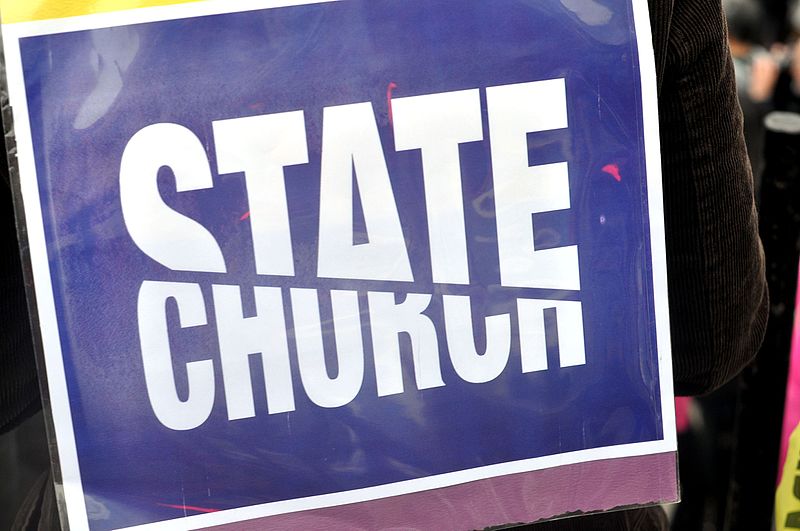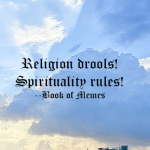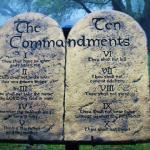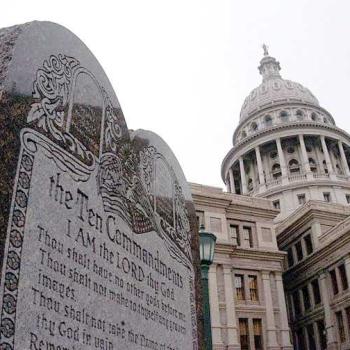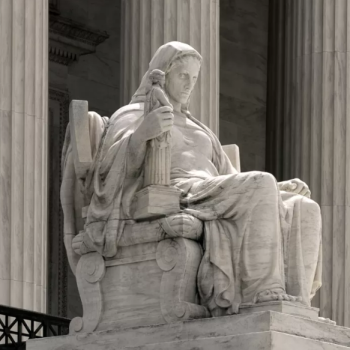The relationship of church and state is one of the vexing issues of our time. It’s been a vexing issue for a while, in fact. This seems especially true in the United States, a nation that combines a lot of fervent religiousity with a constitution intended to freeze religious authority out of the government. Many fervently religious people don’t see the harm in using government to spread and enforce their beliefs. They consider separation of church and state oppressive. But others consider religion oppressive and want the separation of church and state upheld.
Part of the reason it’s hard to separate church and state is that religion and government have been tightly entangled from the beginnings of civilization. Archeologists say that evidence of religion or something like it goes back to the Middle Paleolithic era, which lasted from about 250,000 to 30,000 years ago. Such evidence includes burials with grave goods, suggesting a belief in an afterlife. It’s speculated that cave art provides a glimpse at ritualistic or shamanistic practices, possibly intended to keep away dangers or ensure a successful hunt. Belief in gods probably developed during the Middle Paleolithic period also, although exactly when is difficult to pin down.
More important, it’s believed religion played a central role in the rise of the earliest civilizations. People with shared beliefs and values were able to trust each other enough to form communities and build complex societies around those beliefs and values.
The Divine Power of Kings
In the great civilizations of the ancient world, beginning with Mesopotamia ca. 4000 BCE, we see political and religious authority fused together. It was common for rulers to be thought of as either gods or the divinely appointed representatives of gods. The authority to govern came from religion, in other words. In ancient civilizations of both hemispheres, from the Egyptians to the Inca, religion was inseparable from politics and society and touched all parts of day-to-day life.
In various ways this connection between temporal and divine power continued for centuries. Europeans believed in the divine right of kings. Emperors of China enjoyed the mandate of heaven for their authority to rule. In civilizations throughout the globe it was common for rulers to be both divine and “defenders of the faith,” responsible for maintaining and supporting the priesthood. Traces of this connection between religion and monarchs continue to the present day. When King Charles III was crowned in 2023, the ceremony included an annointing of the King by the Archbishop of Canterbury that marked the sacred connection between the King and his God.
Or, Maybe Not: The Axial Age
But there are aspects of religion that have nothing to do with government. Religion as we know it today is, mostly, a product of the Axial Age, a period roughly in the middle of the 1st millennium BCE. Even the traditions that can claim to be much older — Hinduism and Judaism — largely came to be what they are today during the Axial Age. Historians tell us that true monotheism, the proposal that there is only one God, emerged in about the 6th century BCE, for example. This period also takes in the life of the Buddha and Confucius. The early Greek philosophers Xenophanes, Heraclitus, Democritus, and Socrates were all sons of the Axial Age. Note that this was before western civilization had sorted religion and philosophy into separate filing cabinets.
The Axial Age was a time in which humans began to look beyond performing rituals to please gods so the crops will grow and ask bigger questions. What is the fundamental nature of existence? What is the fundamental nature of the self? And what is the relationship of an individual being to the vast, unknowable cosmos?
This was also the time in which compassion and benevolence emerged as essential virtues. It seems all of the many variations of the Golden Rule — do unto others as you would have done unto you — were written during the Axial Age. Texts about morality from earlier times — including the Ten Commandments — emphasized obeying rules. Axial Age teachers spoke of loving kindness and cultivating a good heart. While some had a lot to say about the connection between religion and government, a few — the Buddha, for example — said very little about politics. And at least one post-Axial Age teacher, Jesus, explicitly separated political power from religion. See, for example, Mark 12:17 — “Render to Caesar the things that are Caesar’s, and to God the things that are God’s.”
The Age of Enlightenment
Still, in much of the world religion and government were tangled up together for many centuries. In truth, many so-called “wars of religion” — including much of the violence during the Reformation — were as much if not more about political power as religious doctrine. Then in 17th and 18th century Europe the Enlightenment began to divorce political and religious authority. Enlightenment thinkers such as Voltaire (1694-1778) were hostile to relgious authority and the power of the clergy. The French Revolution, which began in 1789, was a revolt against the Catholic Church as much as against the monarchy. For a time France was officially “de-Christianized.”
In the newly established United States, founders and future presidents James Madison and Thomas Jefferson worked hard to separate church and state. They left us copious writing explaining why they thought the authority of religion, including Christianity, must be kept separate from government for the good of both religion and government. In the United States, religion was to be a matter of personal conscience, freely exercised without interference by governent. This meant a majority religious faction could not use government to force its beliefs and practices on others. For more on how religion was purposefully kept out of the Constitution, please see “The Myth of the Christian Nation.”
A Revolutionary Declaration
Today, Americans eager to Christianize their government like to point to Jefferson’s words in the Declaration of Independence — “We hold these truths to be self-evident, that all men are created equal, that they are endowed by their creator with certain unalienable rights, that among these are life, liberty and the pursuit of happiness.” See? He said creator (wink, nudge). He meant for the U.S. to be a godly nation.
But then there’s the next clause — “That to secure these rights, governments are instituted among men, deriving their just powers from the consent of the governed.” In 1776, this was revolutionary. For centuries, rulers of Europe were presumed to have received authority to govern from God. But Jefferson said the only just powers of government come from the people. And true democracy (from the Greek dēmokratia, “the people rule”) cannot exist where the authority to govern is conferred by religion. Jefferson also once said, “History, I believe, furnishes no example of a priest-ridden people maintaining a free civil government.”
But history shows us millennia of religious and political authority fused together, and I suppose it’s a lot to ask of everyone to adjust to separation of church and state in just 250 years. It’s possible the current Christian Nationalism movement may have flared up because fervently religious people realized courts were taking the Constitution seriously.
